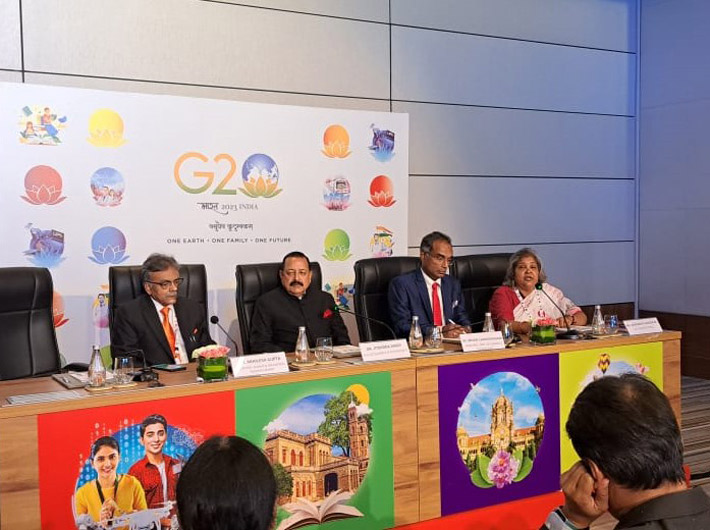India has huge bio economy advantage; committed to UNSDG 2023, says union MoS Dr Jitendra Singh
The fifth and final G20 Research and Innovation Ministerial Meeting (RIIG) chaired by Union Minister of State (Independent Charge) for Science and Technology, Jitendra Singh concluded in Mumbai on Wednesday.
Topics including challenges related to energy, materials and devices, solar energy utilizations, photovoltaic technologies, materials and processes for green energy as well as policy issues like role of research, development and innovation in creating new resource efficient, sustainable, circular and bio based technologies, product and services, understanding of blue economy, sectors and opportunities were discussed.
After a series of meetings and discussions, four key priority areas -- Materials for Sustainable Energy; Circular Bio-Economy; Eco-Innovations for Energy Transition; and Sustainable Blue Economy under the broad theme of ‘Research and Innovation for an Equitable Society’ -- were identified.
Recognising the importance of adoption of initiatives that promote lifestyles for sustainable development such as India’s LiFE initiative, the G20 Research Ministers expressed commitment to achieving a resilient, inclusive, and sustainable future. They also reaffirmed their commitment to open, equitable and secure scientific collaboration in the identified priority areas for developing solutions that address societal and global challenges. They acknowledged that in the pursuit of sustainable development, there is a need to expand the production and utilization of clean energy and to promote affordable, reliable and sustainable energy for all.
Singh said that consensus on two paragraphs could not be achieved and therefore an outcome document will be issued.
“While we did try to achieve consensus on a joint declaration, despite agreement on most paragraphs, we did not have consensus on two paragraphs. Therefore, we would be issuing an outcome document and chair summary, ” he said.
During the meeting, the important role which science, technology and research play in supporting a more circular and sustainable bio-economy as also the need for innovation across all industrial supply chains, from raw materials to finished products, while meeting food security needs were recognized.
The Ministers also stressed the need to further develop capacities for more and better sustained coastal and ocean observations, monitoring and forecasting systems, through enhanced international coordination and cooperation for achieving the objectives of a sustainable blue economy or ocean-based economy.
The G20 Ministers also expressed their commitment to encourage the mobility of students, scholars, researchers and scientists across research and higher education institutions through mobility programs.
They unanimously agreed to recommend the elevation of the RIIG to the status of a formal G20 Research and Innovation Working Group (RIWG) under the Sherpa Track.
Singh said that India is fully commuted to achieve UNSDGs 2023 by way of research and innovation through international collaborations and participations.
Later while addressing the media, Singh said that across the world growth is going to be technology driven and our parameters and concerns too will also be global. He said that in the last 8-9 years India has achieved global role in leading in global arena and it makes all activity and endeavors related to science and technology much more important.
He said after PM Modi’s visit to the US we are now almost operating from an equal platform. Today the US is looking forward to have an Indian astronaut to the international space station. We are now in a position where we exchange our best practices.
“In the last 8-9 years PM Modi has created huge leverage for scientific fraternity to express its potential to the maximum extent. Till 4 years back space sector was working behind a wheel of confidentiality … it has been thrown open to private participation…. Today India is seen to be leading in finding solutions to these newer and recent issues that have cropped up globally.”
Singh also added that India has huge advantage when it comes to bio economy. “We have huge Himalayan and aromatic resources, biodiversity resources and ocean resources… we have 7,500 kms long coastal area.. the present govt has given a huge advantage in some unexplored areas with deep sea mission…,” he said.

